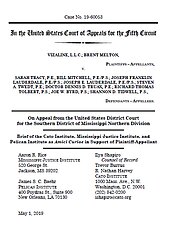Learn more about Cato’s Amicus Briefs Program.
When banks acquire large pieces of property, usually as collateral for mortgages or other sizable loans, they are typically required to conduct a land survey in order to determine the legal boundary lines. For smaller loans, however, conducting surveys—which are often prohibitively expensive—isn’t required or financially feasible. Even so, banks and consumers can still benefit from having a better understanding of smaller properties’ boundary lines.
Enter Vizaline, a Mississippi startup that uses public information and geospatial imaging technology to create user-friendly and cost-effective maps of banks’ properties. Although Vizaline uses data that professionally licensed surveyors have generated, it does not conduct surveys or hold itself out as being a professional surveyor. Vizaline simply uses, generates, and disseminates geospatial information that already exists to make it easier for banks to access that information. Nevertheless, Mississippi’s Board of Licensure for Professional Engineers and Surveyors sued Vizaline for the unlicensed practice of surveying. With the help of our friends at the Institute for Justice, Vizaline fought back, seeking to vindicate its First Amendment right to use public information to advise clients about their property portfolios. But the federal district court wrongly concluded that Mississippi’s licensing restrictions only “incidentally infringed” upon Vizaline’s speech and did not violate the First Amendment.
Vizaline is now appealing its case to the Fifth Circuit. The Cato Institute, along with the Mississippi Justice Institute and Pelican Institute, have filed a brief in support. We urge the Fifth Circuit to overrule the district court’s determination that states can require a license before individuals can use and disseminate public information.
The district court’s decision plainly contradicts a series of U.S. Supreme Court cases holding that dissemination of public information, even for profit, is speech protected by the First Amendment. As the Court recently said in National Institute of Family & Life Advocates v. Becerra, First Amendment protection also extends to speech uttered by professionals, which is treated just like other kinds of protected speech. Requiring a license to speak to clients about publicly available information imposes an unconstitutional burden on Vizaline’s speech based both on the content of the speech and the identity of the speaker. Such restrictions on clearly protected speech are subject to strict scrutiny—the highest level of judicial review—and a standard the licensing board frankly can’t meet.
This is yet another instance of a licensing board’s engaging in cartel-like behavior to protect industry insiders. The self-serving licensing board is trying to use vague, broad statutes to define Vizaline’s business as “unlicensed surveying.” However, the First Amendment prevents states from fashioning a favored meaning of a term like “surveyor” to stop innovative companies from exercising their speech rights. Courts must apply meaningful scrutiny when licensing boards impose restrictions on who can and who can’t use and disseminate public information, especially when those licensing boards have perverse incentives to silence industry competitors and stifle innovation.

This work is licensed under a Creative Commons Attribution-NonCommercial-ShareAlike 4.0 International License.
